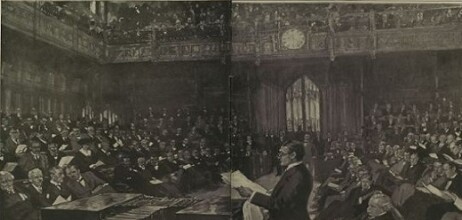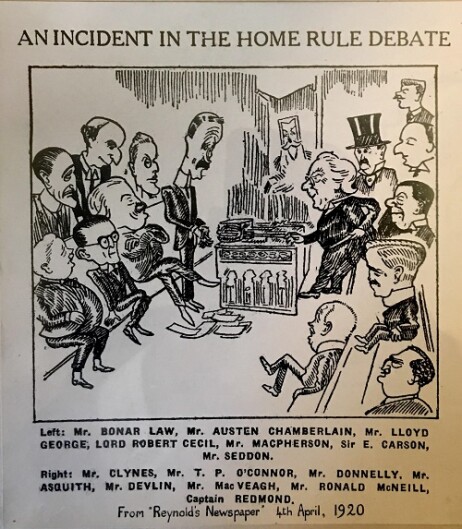In recent commentary, academic and otherwise, on the centenary of Northern Ireland, there has been no reference to the fact that the imposition of partition on the island of Ireland in 1920-21 was facilitated by the absence of a strong Irish nationalist party at Westminster, the consequence of Sinn Féin’s policy of not taking their seats in the House of Commons – their policy of abstentionism.
It had become obvious very early on in the Irish Home Rule crisis of 1912-14 that some form of partition was in the offing. The extent of the area to be excluded from the jurisdiction of a Dublin parliament and the duration of that exclusion were the subject of intense debate right up to the inconclusive Buckingham Palace conference in July 1914, just before the outbreak of the First World War. The bottom line for John Redmond and the Irish party at Westminster was that partition should be strictly temporary and limited to the four north-eastern counties that had clear Unionist majorities. That wasn’t enough for the Unionists, and so no settlement was agreed at that time. The point to note is that the Irish party at Westminster were in a position to block the Unionist demands despite the threat of violence by Ulster Unionists, backed by the British Conservative party.
The reason for this was that the second of two indecisive general elections in 1910 had given the Irish party, with 74 seats in the House of Commons, the balance of power. This enabled them to get Home Rule back on the political agenda for the first time since Gladstone's fourth and final premiership came to an unhappy end on the issue of Home Rule in 1894. The Liberal government took up the cause of Home Rule after 1910 out of political necessity – not with any Gladstonian moral purpose. In short, they were forced to do so by the parliamentary arithmetic.
Moreover, as James Doherty points out in his recent study Irish liberty, British democracy, there was solid support for Home Rule among the British public, particularly the rank-and-file of the Liberal party – as distinct from the party’s leadership. He presents an impressive array of material from pamphlets, newspapers and periodicals to support this contention. He shows that, with the veto of the House of Lords abolished by the 1911 Parliament Act, passage of a Home Rule Bill was widely regarded throughout Britain as a test of the new political dispensation – in other words, a test of whether the will of the House of Commons would prevail. He elaborates as follows: ‘the essence of Unionist opposition, Liberal writers asserted, was an effort to preserve oligarchy, while Home Rule was a struggle to assert democratic rights ... the assault on Home Rule [was] a fresh eruption of the constitutional struggle between peers and people, one that sought to turn the democratic tide that had been rising for decades.’[1]


Published: 12 May 2021 Categories: Decade of Centenaries, History, Politics

